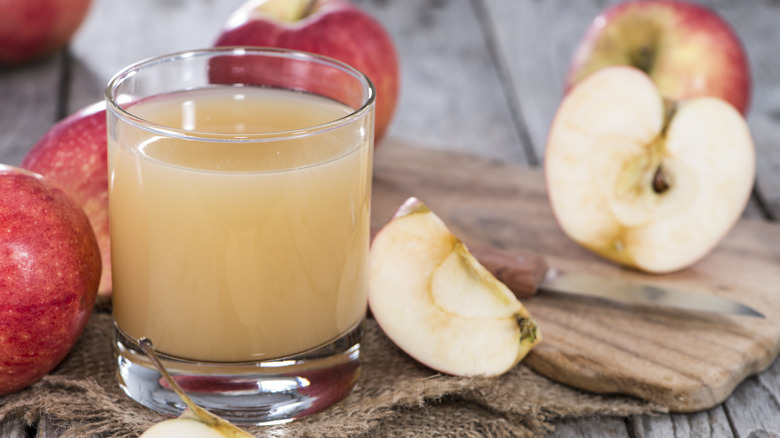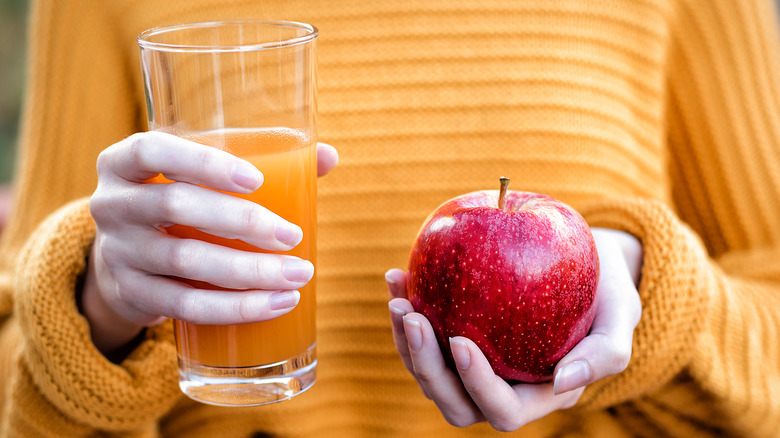Could Drinking Apple Juice Help People Over 50 Age More Gracefully? We Explain
We may receive a commission on purchases made from links.
Kids love the naturally sweet taste of apple juice, and parents know how apple juice can provide nutrients to support young lifestyles. An 8-ounce glass of apple juice is fortified with 76% of your daily vitamin C plus calcium and potassium for fluid balance. Apple juice isn't just for kids, though: Polyphenols in apple juice might help you in your later years.
"Apple juice has been suggested to support brain function as an individual ages due to the antioxidant activity of the polyphenols present in the juice," Jenny Taitz, Psy.D. tells Health Digest. "That said, there is limited research suggesting that apple juice may improve behavioral side effects in patients with Alzheimer's."
Taitz is referring to a 2010 clinical trial published in the American Journal of Alzheimer's Disease and Other Dementias, which had 21 people with moderate-to-severe Alzheimer's drink two 4-ounce glasses of apple juice a day for a month. Although the apple juice didn't improve the memory of people with Alzheimer's, their caregivers saw a 27% improvement in symptoms such as anxiety, agitation, and delusions.
Apple juice can be bad for your heart
However, apple juice might not be the healthiest choice to help you age more gracefully due to its high sugar content. Apple juice has 113 calories that come from more than 29 grams of sugar. Without any fiber, fat, or protein, a glass of apple juice can easily spike your blood sugar and lead to weight gain. Too much sugar in your diet can affect your heart health by increasing your triglycerides, LDL cholesterol, blood pressure, and inflammation.
Apple juice has some of the highest amounts of fructose, and drinks high in fructose might lead to a higher risk of cardiovascular disease, according to a 2017 article in BMC Nutrition. People who drank apple juice, fruit drinks, and soft drinks sweetened with high fructose corn syrup more than five times a week were more than twice as likely to develop cardiovascular disease.
Apples are a great source of polyphenols and pectin that can help lower your cholesterol. However, the pectin is typically stripped away when apples are processed. In a 2012 study in the European Journal of Nutrition, people ate either apples, apple pomace, cloudy apple juice, or clear apple juice every day for 4 weeks. When the people drank clear apple juice, their LDL levels were almost 7% higher than when they ate whole apples or apple pomace.
Apple juice can be healthy in moderation
You don't need to eliminate apple juice completely from your diet for healthy aging. Some types of apple juice can have some health benefits, according to a 2022 review in Nutrients. Cloudy apple juice retains more antioxidants than clear apple juice to reduce oxidative stress in your body. Limited studies suggest cloudy apple juice might also reduce your risk of cancer by protecting your cells from DNA damage. The polyphenols in apple juice might help improve your gut health and reduce your risk of colon-related diseases.
Registered Dietitian at MyFitnessPal Joanna Gregg tells Health Digest that you can enjoy a little cloudy apple juice every once in a while, but an apple a day is better for its fiber. "When choosing an apple juice, look for varieties that contain 100% juice with no added sugars and consume it with foods containing fiber and protein which can help control the rise in blood sugar," she said. Lakewood Organic Apple Juice is a cloudy apple juice that has 1 gram of fiber from organic apple puree.



